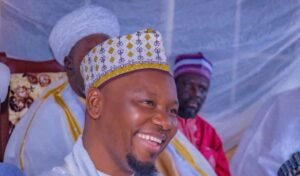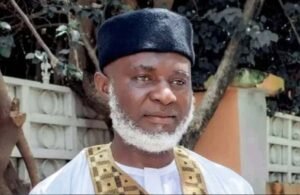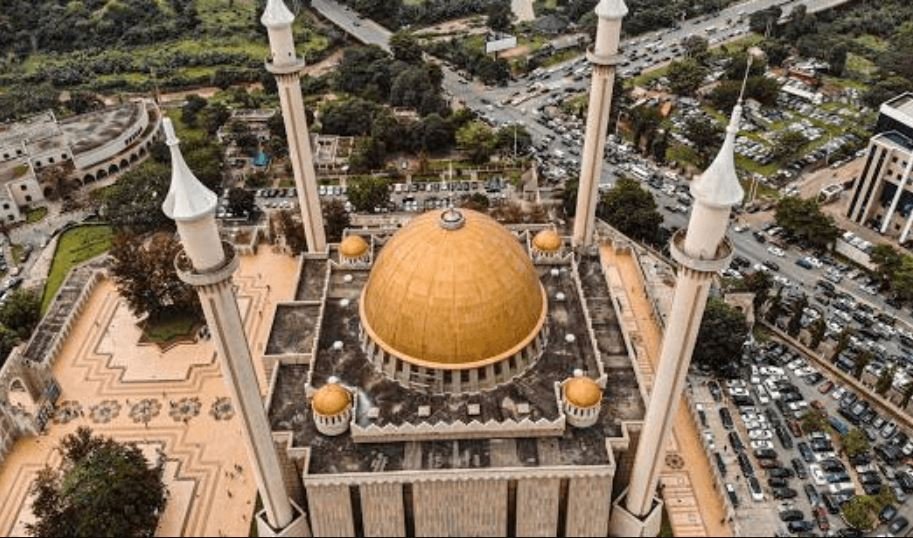The Abuja National Mosque, also known as the Nigerian National Mosque, was built during the administration of President Shehu Shagari.
Construction began in 1982 and was completed in 1984. The project was overseen by Lodigiani Nigeria Limited and designed by AIM Consultants Limited.
READ ALSO: Top 5 Largest Mosques In Nigeria (2025 List)
History Of Abuja National Mosque
The Abuja National Mosque’s history began in the early 1980s when Nigeria’s government, led by President Shehu Shagari, decided to move the country’s capital from Lagos to Abuja.
In 1981, prominent Muslim leaders from different parts of Nigeria proposed building a national mosque. They planned to gather financial support from both local and international sources.
The idea gained strong support within the Muslim community, leading to the creation of the Abuja National Mosque Council.
This council was led by Sultan Abubakar III, who collected resources and encouraged support for the project. Construction of the mosque began in 1981 and was completed in 1984.
The construction work was done by Aims Construction Limited, while the design was handled by AIM Consultants Limited.
Lodigiani Nigeria Ltd. was the general contractor. The mosque is known for its stunning golden dome and four tall minarets, which make it a beautiful part of Abuja’s skyline.
Although the mosque was completed in 1984, it officially opened in 1991, the same week Abuja became the capital city of Nigeria.
It can hold around 25,000 worshippers and has additional facilities for conferences, an Islamic center, a library, and living spaces for religious leaders. The Abuja National Mosque is open to visitors, including non-Muslims, except during prayer times.
In recent years, the mosque’s management has changed, with Professor Shehu Ahmad Galadanci now serving as Murshid, handling both spiritual and administrative duties.
READ ALSO: Top 10 Largest City In West Africa By Population
Who Is The Current Chief Imam Of Central Mosque Abuja?

Dr. Abdulkadir Salman Jummu’ah Solagberu is the current Chief Imam of the Central Mosque in Abuja, Nigeria. He was officially appointed on December 2, 2024, with approval from the Nigerian Supreme Council for Islamic Affairs.
Dr. Solagberu is a prominent Islamic scholar and leader from the Ilorin Emirate in Kwara State, Nigeria. He is also the founder of Darul Kitaab Wa Sunnah, a popular institution for Arabic and Islamic studies.
In addition, Dr. Solagberu has been appointed as a member of the International Union of Muslim Scholars (IUMS), an organization with over 90,000 members worldwide.
This international body focuses on uniting Muslims and advancing Islamic knowledge. Dr. Solagberu’s specific role within the IUMS is in the Islamic Jurisprudence Researchers Division.
His appointment as Chief Imam was well-received by prominent figures and organizations. The Sultan of Sokoto, Alhaji Muhammad Sa’ad Abubakar III, who is also the President-General of the Nigerian Supreme Council for Islamic Affairs, described the appointment as well-deserved.
The Sultan praised Dr. Solagberu for his contributions to the propagation of Islam and encouraged him to continue promoting unity among Muslims in Nigeria and beyond.
Also, the Ilorin Emirate Descendants Progressive Union (IEDPU) congratulated Dr. Solagberu, commending his efforts in preserving the religious and cultural heritage of the Ilorin community.
READ ALSO: List Of Oba Of Benin From 1200 AD Till Date
Who Was The First Igbo Imam Of Central Mosque Abuja?

The first Igbo Imam of the Central Mosque in Abuja is Professor Iliyasu Usman. His appointment was a historic moment for the mosque and the Muslim community in Nigeria.
Professor Usman delivered his first sermon during the Jumm’at prayer. This appointment has been widely celebrated, especially by the South East Muslim Organisation of Nigeria (SEMON), which sees it as a recognition of his dedication to Islamic scholarship and leadership.
SEMON congratulated Professor Usman and described his appointment as both a personal achievement and a divine responsibility.
They expressed their belief that his role would strengthen the Igbo Muslim community and encourage greater unity among Muslims in Nigeria.
Professor Usman will work alongside two other active Imams, Professor Ibrahim Makari and Professor Muhammad Kabir, to lead the Juma’ah and daily prayers.

